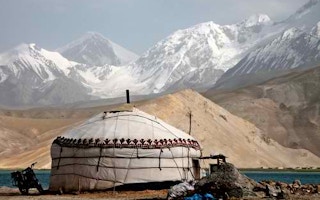Tourists have been forbidden from entering glaciers in northwest China’s Xinjiang Uygur Autonomous Region, authorities said on Thursday.
“Glacier tourism brought in revenue of less than one billion yuan (152 million US dollars) over the past dozen years, but the loss from shrinking glaciers is incalculable,” said Li Jidong from the regional tourism administration.
According to the new regulation, tourists are only allowed to enjoy the sight of glaciers from a distance instead of walking on them.
Statistics showed the temperature of the region has risen 0.33 degrees Celsius to 0.39 degrees Celsius per decade over the past 50 years, almost three times the global average.
China has 46,377 glaciers, with 18,311, or 46.8 per cent of the national ice reserves located in Xinjiang. Global warming, grazing, mining and tourism have accelerated destruction of the glaciers, and led to water shortages in several areas.
Glacier meltwater accounts for about 25 to 30 percent of Xinjiang’s surface run-off, and the thawing of the glaciers could have a disastrous effect on the region, according to the Tianshan Mountains Glacier Observation Station under the Chinese Academy of Sciences (CAS).
Approximately 120 km from the regional capital of Urumqi, Glacier No. 1 in the Tianshan Mountains is the closest glacier to a city in the world. The meltwater from the glacier has reduced after years of receding.
Small glaciers at low altitudes are more sensitive to climate change, said Chen Xi from the CAS.
“Glaciers in the Tianshan Mountains have receded by 15 to 30 per cent in the last three decades.” Chen said. “And they will continue to retreat by 60 per cent in the next 20 years, and by 80 to 90 per cent half a century from today.”
To protect the city’s water supply, Urumqi banned tourists from the glacier back in 2006, but visitors manage to find their way into the area.
More than a dozen families of herdsmen still inhabit the area and to make money, some herdsmen take tourists to the area by motorcycle.
A recent visit by Xinhua reporters found plastic waste scattered in many areas, indicating visits made by tourists.
All mining has ceased in a 948-sq-km protection zone. Vehicles on section of national highway near the zone are restricted and wild herb digging is banned.
Xinjiang has called for other countries and regions along the Tianshan Mountains to stop glacier tourism as well.

















